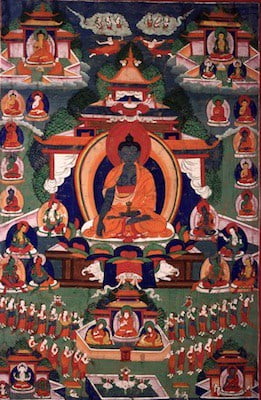Akṣobhya Buddha’s name translates as ‘Not Disturbed’ or the ‘Immovable One.’ He is the buddha of the eastern realm of Abhirati. A well-known buddha in early Mahāyāna, within the Vajrayāna tantras he is the head of the vajra family in the east.
The earliest reference to Akṣobhya seems to be the lengthy Mahāyāna sūtra, the Akṣobhyatathāgatasyavyūha Sūtra that was translated into Chinese in the 2nd century CE. In that sūtra, the story of Akṣobhya’s path to buddhahood is related. According to the text, as an anonymous monk studying under the Buddha ‘Great Eyes’, he was inspired to enter the bodhisattva path. Warned that this path was extremely difficult because a bodhisattva must remain without anger toward any being, he immediately declared publicly his promise and determination not to give rise to anger, malice or hatred toward any sentient being until his awakening. Having proclaimed a long series of vows, another anonymous monk suggests that he be known as the bodhisattva-monk Akṣobhya due to his steadiness.
Many Tibetan masters have composed supplications and praises to Akṣobhya, and the Gyalwang Karmapa frequently cites him as an aspiration for his own practice.
ཨེ་མ་ཧོ།
emaho
Emaho!སྔོན་ཚེ་རྣམ་དག་ཐུགས་བསྐྱེད་སྨོན་ལམ་མཐུས། །
ngöntsé namdak tukkyé mönlam tü
Through the power of your pure past intentions and prayers of aspiration,ད་ལྟ་ཤར་ཕྱོགས་མངོན་དགའི་ཞིང་མཆོག་ཏུ། །
danta sharchok ngöngé zhing chok tu
Now, to the east, in the supreme pureland of Abhirati—Manifest Joy,མངོན་པར་སངས་རྒྱས་རྒྱལ་བ་མི་འཁྲུགས་པ། །
ngönpar sangye gyalwa mitrukpa
You are the fully awakened victorious one Akṣobhya,འགྲོ་བའི་མགོན་པོ་ཁྱེད་ལ་གསོལ་བ་འདེབས། །
drowé gönpo khyé la solwa deb
Protector of beings—to you I pray.ཁྱེད་ནི་སྟོབས་བཅུ་ལྡན་པའི་ཡེ་ཤེས་བརྙེས། །
khyé ni tob chu denpé yeshe nyé
You have found wisdom endowed with the ten powersམ་ལུས་ཤེས་བྱ་ཡང་དག་ཇི་བཞིན་གཟིགས། །
malü sheja yangdak jizhin zik
And you see all that is knowable just as it is,བདག་ནི་རྒ་ན་འཆི་སོགས་འཇིགས་པ་བརྒྱས། །
dak ni ga na chi sok jikpa gyé
While I am plagued by a hundred terrors, such as aging and death.མནར་བཞིན་ཁྱེད་ལ་སྐྱབས་སུ་མཆི་བ་གཟིགས། །
nar zhin khyé la kyab su chiwa zik
Look upon me now as I turn to you in search of refuge!མགོན་པོ་ཁྱེད་ནི་མཐའ་ཡས་འགྲོ་བ་ལ། །
gönpo khyé ni tayé drowa la
Protector, you who gaze upon all infinite beingsསྙིང་རྗེ་ཆེན་པོས་གཟིགས་པ་ཡོལ་མི་མངའ། །
nyingjé chenpö zikpa yol mi nga
With great compassion and unimpeded vision,བདག་ནི་ཤིན་ཏུ་ཉམ་ཐག་འཇིགས་ཆེན་གྱིས། །
dak ni shintu nyamtak jik chen gyi
Be a refuge to me, as I am utterly exhausted,གསོར་མི་རུང་བར་མནར་ལ་སྐྱབས་མཛོད་ཅིག །
Prayer to Akṣobhya by Mipham Rinpoche.
sor mi rungwar nar la kyab dzö chik
Hopelessly tormented by anxiety and dread.
Among the features of Akṣobhya’s realm, the sūtra emphasizes the ease of attaining Arhatship in bhirati. There, uncountable shravakas, or listeners, become arhats whenever Akṣobhya turns the Dharma wheel, and it is rare for someone not to attain that level after a mere four talks. In addition, the residents of Abhirati will not need to take rebirth before attaining their liberation. Innumerable bodhisattvas also abide in Abhirati, where they also proceed swiftly along the bodhisattva path, practicing great austerities and receiving teachings and being reborn only into other buddhafields until full and complete enlightenment is attained.


